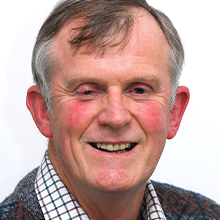Professor Anthony Nash FRSE:1949–2023
07 June 2023

Anthony Nash (Tony), known internationally for his work on viral immunology, has died aged 74.
Until his retirement in 2014, Tony was Chair of Veterinary Pathology at the Roslin Institute, University of Edinburgh.
Tony spent his career studying the pathogenesis and immunology of virus infections, including herpesviruses and influenza. Throughout his career, he was an innovative scientist, actively embracing new ideas and technologies and promoting cross-disciplinary interests. His internationally-recognised research pioneered our understanding of how different types of T cells control virus infections.
Born in Coalville, a small mining town in Leicestershire, Tony went on to study Biochemistry at Queen Elizabeth College, London, before moving to the University of Birmingham, where he obtained a PhD in 1976 studying the heterogeneity of T lymphocytes. He then moved to the University of Cambridge and embarked on the study of the importance of T lymphocytes in herpes simplex virus infection. This was at a time when little was known about the function of different types of T lymphocytes in control of virus infections and his work played a significant role in shaping what we now know about anti-viral immunology. It was there, during this period, with Stephen Cobbold and Herman Waldmann that he pioneered the use of monoclonal antibodies to remove different types of T lymphocytes, and by doing so determined their relative importance in control of virus infection. These observations underpinned the development of monoclonal antibodies for human therapies that are still used today.
In 1994, he moved to the University of Edinburgh as Chair and Head of Veterinary Pathology, where he continued his work on the pathogenesis and control of infection by herpes viruses as well as influenza viruses. He had an enthusiastic and charismatic leadership style and he had the vision to draw together the University’s research in virology from medical and veterinary areas under one roof, encouraging interactions between scientists and social scientists and enhancing interdisciplinary research. Enacting ‘one health’ in a practical sense before the term had been coined. He also successfully led a major Scottish consortium of scientists to establish the Interdisciplinary Centre for Human and Avian Influenza Research (ICHAIR) which brought together molecular virologists, immunologists, modellers and bioinformaticians across Scotland to investigate influenza disease and identify novel ways of controlling infection. His vision and leadership made a major contribution to the current vibrant influenza virus research community in Scotland.
Throughout his career at both the Universities of Cambridge and Edinburgh, Tony was known as an inspirational educator to both undergraduate and postgraduate students. He was a popular lecturer and sought after speaker. He had a compassionate genial style of mentoring that made him a joy to work with. His trainees fondly remember his jovial banter in the laboratory, often lightening the mood of the day. Nevertheless, Tony was an excellent and rigorous researcher, and many of his students and postdocs went on to pursue successful careers around the globe. He authored and co-authored several books, including ‘Mims Pathogenesis of Infectious Disease’ that were routinely used as standard texts for students.
Tony was tirelessly enthusiastic and passionate about promoting and supporting research, sitting on numerous review groups, advisory boards and external examination panels. For over a decade, he held major roles in the UK Research Councils, including chairing grant-awarding panels, decision-making bodies and serving on the Council of the Biotechnology and Biological Sciences Research Council from 2002–2005. He had a lifelong involvement with the Microbiology Society, serving on their governing body from 2000–2004 and was Editor of the Journal of General Virology from 1989–1996. He also served on the editorial boards of numerous national and international scientific journals.
In recognition of his contributions to science, he was elected Fellow of the Academy of Medical Sciences in 1999 and Fellow of the Royal Society of Edinburgh in 2005.
Tony was diagnosed with Parkinson’s disease in 2005. In typical pragmatic and enthusiastic fashion, he carried on working and travelling to conferences until his retirement in 2014.
He has left a considerable and lasting legacy to the field of infectious disease research. Known for being a consummate gentleman, he had a reputation for integrity, fairness and good humour. He will be fondly remembered by many whom he inspired and mentored over the years.
Outside work, Tony was dedicated to his family and was a keen sportsman. He played amateur football and cricket and was also a committed, lifelong Leicester City F.C. supporter.
Tony is survived by his wife Marion, his daughters Laura, Ruth, Esther and Hannah and five grandchildren.
Anthony Aubrey Nash, born 6 March 1949 and died 20 May 2023.
Obituary contributed by James Stewart, Bernadette Dutia, Paul Digard, and Ed Usherwood.
